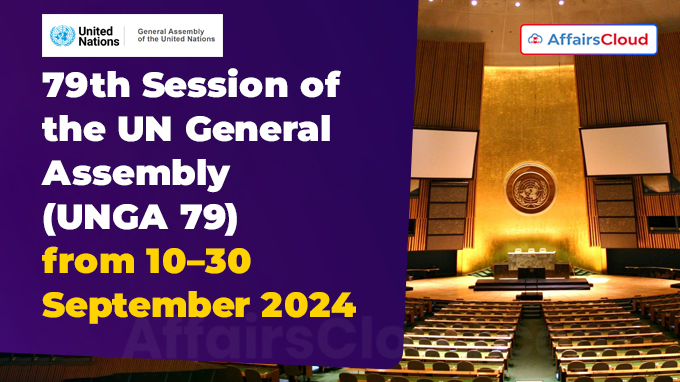
The 79th session of the United Nations General Assembly (UNGA 79) was held from 10th to 30th September 2024 at the United Nations (UN) headquarters in New York, the United States of America (USA).
- Philemon Yang, the former Prime Minister of Cameroon, was the President of the 79th session of UNGA.
Highlights of UNGA 79:
i.The 79th session of UNGA commenced on 10th September 2024.
ii.The general debate of the UNGA 79 was held from 24th to 28th September 2024 under the theme “Leaving no one behind: acting together for the advancement of peace, sustainable development and human dignity for present and future generations”.
- The debate closed on 30th September 2024.
iii.The “Summit of the Future” was held from 22nd – 23rd September 2024.
- 3 agreements – Pact for the Future, Global Digital Compact, and Declaration on Future Generations – were adopted during the summit.
Palestine takes seat among UN member states at UNGA 79
During UNGA 79, the State of Palestine, a non-member observer state of the UNGA, was given a seat in the General Assembly Hall among the UN member States.
- Riyad Mansour, Palestinian Authority’s envoy to the UN, took his place at the table marked “State of Palestine” between Sri Lanka and Sudan.
Points to note:
i.On 10th May 2024, a resolution was adopted to recognise the reconsideration of Palestine’s UN membership in the UN Security Council(UNSC) and the granting of additional rights to Palestine, which holds observer status.
ii.This allowed Palestine to participate in UNGA sessions, UN meetings and conferences, specifying that this would be done on an exceptional basis and without setting a precedent.
iii.The resolution had won a resounding majority of 143 votes in favour, including by India.
iv.As of June 2024, the State of Palestine is recognised as a sovereign state by 146 of the 193 member states of the UN (over 75% of all UN members). It has been a non-member observer state of the UNGA since November 2012.
CSIR Organised 5C for Global Sustainable Development at 2024 Science Summit:
The Council of Scientific and Industrial Research (CSIR), organised the “CSIR for Connect, Collaborate, Converge and Convert (5C) for Global Sustainable Development” on 18th and 19th September 2024 at the 9th edition of the Science Summit (2024) at the UNGA 79.
- The two-day event included six sessions with 29 speakers and a panel discussion that showed CSIR’s contributions to science and technology and its efforts towards global sustainable development and strengthening South-South cooperation.
Key Points
i.Six scientific sessions were held over the two days. The topics of the scientific sessions include:
- Affordable Healthcare for Global Society
- Food and Agriculture
- Environment and Waste Management
- Sustainable Infrastructure
- Climate Change
- Encouraging South-South Cooperation for Sustainable Development
ii. The “Strengthening South-South Cooperation for Achieving SDGs” was held in collaboration with World Association of Industrial and Technological Research Organizations (WAITRO) and Asian and Pacific Centre for Transfer of Technology (APCTT) with international experts from several International real-time operating system (RTOs), Embassies and NAM Science & Technology Centre (S&T) Centre.
Science Summit 2024:
i.The Science Summit 2024 was organised by the International Science Council (ISC) and its partners from 10th to 27th September 2024.
ii.It is a a premier global event that unites thought leaders, scientists, policymakers, and innovators to address the most pressing scientific and technological challenges of our time.
iii.It serves as a platform to showcase cutting-edge research, share knowledge, and foster inclusive international collaboration.
G-20 Nations Agree to Push for Reform of Global Governance Institutions
G20 member countries agreed to push for modernising the UN, the World Trade Organization (WTO) and multilateral lenders after one-and-a-half months of negotiations.
- A call for reforms was launched during a meeting of G-20 foreign ministers that was suggested by Brazil on the sidelines of UNGA 79.
- It’s the first time that the world’s 20 largest economies formally agreed to make a joint effort to modernize global governance institutions that were created about 80 years ago.
Key Points
i.The three-page document includes the reforms agreed on by the G-20 on three different fronts: the UN, the international financial architecture and the multilateral trading system.
ii.Among the changes proposed include were the reforms of the Security Council, with an expanded structure that improves the representation of underrepresented and unrepresented regions and groups.
- It also demands a more representative UN Secretariat, with transparency, equal geographic distribution, merit and gender balance.
iii.The document reached full support to modernize the leading international bodies, such as the UN and the WTO (World Trade Organization) and the revision of loan quotas at the IMF (International Monetary Fund).
iv.The document also involves commitments to strengthen the Economic and Social Council, the Peacebuilding Commission, and the United Nations Secretariat by deepening their involvement in international economic cooperation forums, such as the G20 and G7; universities and the scientific community; the mobilization of political and financial support for the construction of peace agreements; among others.
India Signs Agreement to Protect Marine Biodiversity on High Seas at UNGA
India has signed an agreement called the Biodiversity Beyond National Jurisdiction (BBNJ) Agreement, or the “Treaty of the High Seas” at the United Nations General Assembly.
- The aim of the agreement is to protect marine life in areas of the ocean that are not owned by any one country.
- This prevents the countries from imposing their right on the resources and ensures equitable share amongst the countries.
- These areas begin 370 kilometers from any country’s coastline and cover two-thirds of the world’s oceans.
Highlights
i.The treaty will frame rules for countries to follow when planning activities in the high seas, like conducting environmental impact assessments to avoid harm to marine ecosystems.
ii.This agreement also helps meet the goals of Sustainable Development, especially SDG 14, which focuses on protecting life underwater.
iii.The agreement allows India to create marine protected areas in the high seas, conduct environmental impact assessments and ensures sustainable use of marine resources. It also promotes cooperation and technology sharing between countries, helping India strengthen its conservation efforts.
India Joins US-Led Minerals Security Finance Network:
India has joined the US-led minerals security finance network, which aims to boost cooperation and promote information exchange and co-financing among institutions taking part from the Indo-Pacific region and Europe.
- This would help India to diversify and secure its supply of critical minerals from nations like Argentina, Chile, Australia, and select African countries.
- The partnership includes 13 countries and the European Commission. These are the United States of America, Australia, Canada, Estonia, Finland, France, Germany, India, Italy, Japan, the Republic of Korea, Norway, Sweden, the United Kingdom, and the European Union (represented by the European Commission).
India Reaffirms Commitment to Combat Antimicrobial Resistance
India has reaffirmed its commitment to antimicrobial resistance (AMR) and emphasized upon the urgent need for global collaboration to curb the increasing threat of AMR at the United Nations General Assembly (UNGA) High-Level Meeting on AMR.
Contribution of India
i.India has taken initiative in fighting AMR since the launch of its National Action Plan (NAP AMR) in April 2017 and has expanded surveillance networks in both the human and animal sectors, reducing hospital-acquired infections, and promoting responsible antimicrobial use.
ii.India has initiated a standardised surveillance system for healthcare-associated infections (HAI) and implemented regulations for prescription-based antimicrobial sales to ensure judicious use of antibiotics.
iii.India has developed an Antimicrobial Stewardship (AMS) Program aimed at decreasing unnecessary antibiotic prescriptions, and has been adopted by hospitals across the country.
iv.The existing One Health structures in the country will be used to enhance coordination across human, animal, and environmental sectors in tackling AMR.
MoS Anupriya Singh Patel addresses High-Level Side Event at UNGA 79
Minister of State (MoS) Anupriya Singh Patel, Ministry of Health and Family Welfare (MoH&FW), addressed a high-level side event of UNGA 79 held under the theme “Revitalized Multilateralism: Recommitting to Ending AIDS Together.”
- The event was organised by the United Nations Programme on HIV/AIDS (UNAIDS), the Global Fund, and U.S. President’s Emergency Plan for AIDS Relief (PEPFAR).
- India has committed to achieving the UN’s Sustainable Development Goal (SDG) of ending HIV/AIDS as a public health threat by 2030.
India’s Efforts:
i.According to the India HIV (human immunodeficiency virus) Estimations 2023 report, the adult HIV prevalence is at 0.2 % and estimated annual new HIV infections are at around 66,400.
- New annual HIV infections have decreased by 44% since 2010 as compared to the global reduction rate of 39%.
ii.India provides comprehensive HIV and Syphilis testing to all pregnant women with more than 30 million free HIV tests being conducted annually.
- More than 1.7 million people are receiving free Anti-retroviral Therapy (ART) through public healthcare systems.
iii.The country currently supplies over 70% of global anti-retroviral medicines, providing affordable access for nations in need.
About United Nations General Assembly (UNGA)
President– Philemon Yang
Headquarters– New York, United States of America (USA)
Founded– 1945




